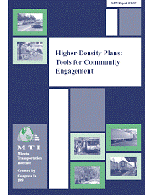- 408-924-7560
- mineta-institute@sjsu.edu
- Donate
Higher-Density Plans: Tools for Community Engagement
This study focuses on the strategies, methods, techniques, and tools that can be used in working with community residents and other stakeholders to increase the intensity of land use—specifically to gain community acceptance of higher-density residential and mixed-use development.
This report provides information that local, regional, and state agencies, planning professionals, and project and plan proponents can use to develop and implement the type of collaborative efforts that involve residents in planning the futures of their communities. The following points summarize the primary research findings:
1. It is critical, before planning any participation effort, to understand current and likely future community concerns about higher-density development.
2. Overcoming distrust and other emotionally based barriers requires a genuine, sincere commitment to community involvement.
3. Community planning and development is increasingly being approached so as to avoid and prevent conflict.
4. Many helpful techniques and tools have been developed and are available for use by local planners in collaborative community-based planning processes.
5. Elected and appointed officials, senior planners, and other staff and consultants must provide skillful and committed leadership for these processes to work.
6. When a group process is chartered, it is valuable to establish broad planning goals and principles at the outset.
7. Ensuring feasible outcomes is a key objective of a successful collaborative planning process.
8. Careful, accurate documentation of the results of a public participation process is critical to retaining the value of the effort.
9. Higher-density projects often maximize benefits to a neighborhood or community only when there is adequate funding to meet infrastructure, facility, and ongoing service needs.
10. Collaborative planning processes hold, in principle, great potential to help California move in the direction of promoting more concentrated and efficient growth practices, but they will be greatly constrained by the broken condition of local government finance.
KENNETH R. SCHREIBER, AICP, Principal Investigator
Kenneth Schreiber, principal investigator of this report, is a self-employed land-use planning consultant. He was a planner, senior planner, and assistant planning director in Rockford-Winnebago County, Illinois, and assistant planning director, director of planning and community environment, and deputy city manager of Palo Alto, California, before opening his Palo Alto-based consulting services office in January 2000. Schreiber earned his Bachelor of Science in history from the University of Wisconsin-Milwaukee, a Master of Arts in History from Columbia University, a Master of Arts in Urban Studies from the University of Wisconsin-Milwaukee, and a Master of Arts in Public Administration from Golden Gate University. His areas of research interest include land-use and transportation strategic planning, rural and urban transportation planning, and transportation demand management.
GARY BINGER, AICP, Research Associate
Research Associate Gary Binger has extensive experience in land use, development processing, and intergovernmental coordination. He has served as an assistant planner in Concord, California; an associate planner in Oakland, California; planning director for the City of Del Mar, California; chief of planning and community development director for the City of Walnut Creek, California; and deputy executive director and planning director of the Association of Bay Area Governments. Since 2000, he has been director of the Urban Land Institute’s California Smart Growth Initiative. Binger earned his Bachelor of Architecture from Cal Poly, San Luis Obispo, and his Master of Urban Planning from the University of Washington, Seattle. He has performed graduate study at the University of Manchester, England, where he studied the British New Town Program. He recently received the Distinguished Leadership Award from the California Chapter of the American Planning Association. His areas of research interest include land-use planning, state and regional planning, smart growth strategies, linking land-use and transportation planning, public participation, and law and environment regulations.
DENNIS CHURCH, Research Associate
Research Associate Dennis Church is president of EcoIQ.com, an Internet publishing and digital media company specializing in environmental, sustainability, and planning issues, and providing educational resources including speakers, video and still images, and related materials. Church has 25 years of local government program development and policy analysis experience. He holds a degree in journalism from San José State University. His areas of research interest include rural and urban transportation planning, state and regional transportation planning, land use, and energy and ecological systems.
-
Contact Us
San José State University One Washington Square, San Jose, CA 95192 Phone: 408-924-7560 Email: mineta-institute@sjsu.edu






